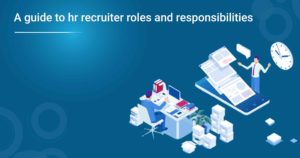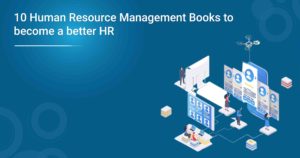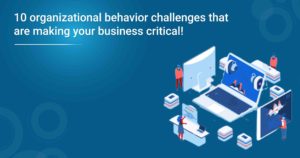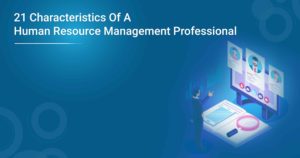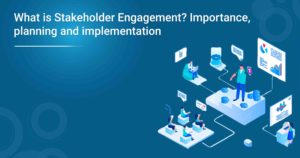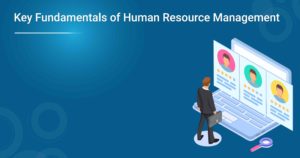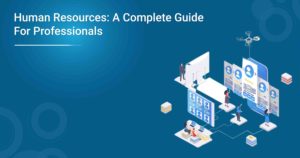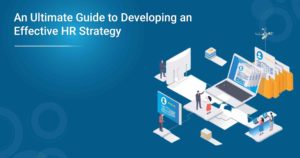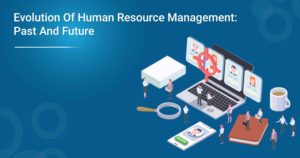What are employee relations?
Happy employees reflect on the growth of an organisation. It is a proven fact that businesses that can manage their better employee relation can lead to a satisfying workplace. Employee relations is a term widely used but never fully understood. It does not just signify the relationship between an employer and an employee but also the organisation’s efforts to maintain a positive work environment. Keeping employees content, engaged and valued is key to an organisation’s growth. The secret is knowing to treat your employees as stakeholders in the company, adding to the profits rather than considering them as just paid workers.
Building an environment that enables their skills and creativity is imperative to allow employees to be more productive. An organisation can ensure this by keeping three c’s in mind:
- Communication – There are many ways we communicate within the workplace through emails, chats in the break room, or through messages. Regular and effective communication can be crucial for the smooth functioning of the organisation. It increases efficiency, drives progress and provides a friendly and positive workplace environment.
- Collaboration – The best way to build a team driven towards common goals is through collaboration. Organising team collaboration sessions boost employee morale, provide them with a common goal, enhance problems solving capacity, and motivate employees to achieve organisational goals.
- Cooperation – Employee participation in decision-making, resolving issues and working together to achieve common goals are all part of workplace cooperation. Embracing and valuing opinions is an important part of building better employee relations.
Why is maintaining better employee relations important?
Maintaining a balanced employer-employee relationship is overly understated. It needs conscious and continual efforts that can result in multiple benefits to an organisation. Some of the most successful businesses maintain employee relations at the centre of their business strategy. Better employee relation can lead to the following:
- Greater employee satisfaction – Employees who are satisfied with their work, workplace and employer will always work better and provide better results. Therefore, the more thought-through and personalised employee engagement, the greater will be your employee satisfaction.
- Increased loyalty – An organisation’s biggest success factor is a loyal workforce. Better employee relation lead to a positive work environment. A positive work environment ensures a loyal workforce, reduced employee turnover and developed skilled labour in the long run.
- Increased motivation – Recognition at the workplace for a job well done is imperative to boost morale and keep employees motivated to continue performing. Appreciation is vital in building a positive growth environment for employees to stay motivated and increase performance results.
- Reduced workplace conflicts – Differences between an employer and employee can cause regular conflicts. Therefore it is imperative to have unbiased conflict resolution systems to manage and diffuse situations effectively.
- Trust and confidence amongst employees – Trust building is not only an employer’s responsibility but also requires similar employee efforts. However, the line of healthy and trusting communication has to start from higher up to enable building mutual trust and understanding.
- A better workplace culture – An organisation’s efforts towards building a better workplace for their employees through effective employee engagement, perks, and fair practices make for constructive workplace culture. This helps not only an employee’s growth but also the organisation’s.
Better employee relations can lead to an effective workplace: Know How?
Performance management is a two-way process and one that needs to be built carefully. When employees are motivated the right way, an organisation can visibility reap its benefits, as mentioned above. In this blog, we put together 11 tips from our experts for improving employee relations. Better employee relation can lead to:
1. Build a bond of trust
The first step towards building trust within the workplace is building a positive rapport with the employees. Without a good rapport, employees find it difficult to build trust with the employer and the organisation. To understand how to build trust within the workplace, it is important to understand what trust in the workplace signifies:
- Having a sense of security
- Developing mutual dependability
- Building credibility over time
By prioritising trust building within the organisation, you ensure a strong sense of belonging and a well-connected and coordinated team. Trust enables a healthy flow of communication, pushing the organisation towards collaborative growth. There are various ways in which you can build trust within the organisation:
- Enable transparency in communication
- Be completely honest
- Show people you care
- Stand up for what feels right
- Always honour your commitments
- Build and value long-term relationships
Also Read: Role Of Human Resource Management in an Organization
2. Increase the ratio of positive v/s negative feedback
Providing feedback is crucial to employee performance at the workplace. While providing healthy and constructive criticism is beneficial, it is equally important to appreciate good work. Recognising your employee’s strengths, successes and achievements motivate an individual to hone their skills, focus on self-improvement and participate willingly in organisational growth. Our experts recommend the following ways to provide positive feedback:
- Say Thank you. Two words can make a bigger difference than you realise.
- Let employees know that they are a valuable part of your organisation.
- Publicly recognise your employees’ achievements.
3. Build a reward system
A free parking space for employee of the month, an extra few days of paid leave, or free club membership are additional motivators that ensure a highly motivated workforce. Building a strategic reward system allows:
- Increased productivity
- Reduced employee turnover
- Improved motivation
Employers must understand that commissions, bonuses, and rewards are different. Rewards are an additional benefit to an employee as an earned perk for a job well done.
4. Conduct regular performance reviews
Creating a culture that promotes performance reviews acts as an effective business strategy. Performance reviews are generally conducted once a year and usually denote a raise in salary, and can also sometimes be considered an activity, not every employee would enjoy participating in. Our experts recommend approaching performance reviews positively and conducting regular reviews since annual performance reviews can be time-consuming and less effective. Conducting regular reviews allow:
- Improved performance due to continual feedback
- Self-reflection and growth in employees
- Reduction in margin for error
5. Promote healthy work-life balance
Today every individual values a healthy work-life balance. Creating an environment that provides employees with the flexibility to pursue other interests beyond work can have a more significant impact than we realise. Although maintaining this balance is not the sole responsibility of an employer, there are certain steps an organisation can take to make sure this balance is well-maintained:
- Offer remote and flexible working options.
- Focus on productivity and not the number of hours spent in the office.
- Encourage regular breaks.
- Value their time off.
- Provide perks that support your employee as well as their family.
6. Create an autonomous workplace
Shaping the work environment to accommodate optimal performance from both employers and employees creates an autonomous work environment. The managers should not be babysitting, and the employees should not be hand-held every step of the way. Better employee relation can lead to a balanced environment and here are the ways it can be achieved:
- Hire people who are autonomous and can take charge.
- Provide guidance when mistakes are made rather than inducing fear through negative reactions.
- Provide freedom of choice within set boundaries.
- Trust your employees to make the right decision.
- Give reigns for ownership to employees.
7. Make work less stressful
Stress is one of the biggest obstacles faced in a modern workplace. Pressure at the workplace due to reasons such as lack of job security or high workload can severely impact productivity. We teach the most effective ways to handle stress and steps to mitigate a demanding work environment to benefit both the organisation and the employee. Here are some ways to manage stress effectively:
- Provide onsite or distance counselling.
- Encourage taking adequate breaks.
- Focus on workplace wellness through different activities such as providing Yoga or gym memberships.
- Encourage social bonding at the workplace through parties, outings, team-building activities and more. Do not try to impose challenges on people; let the employees take up challenges themselves.
Also Read: Objectives & Nature of Human Resource Management
8. Offer career growth and development
For any employee, it is crucial to see a career growth trajectory at their current workplace, which is mentored and guided by their employee relations manager. It is imperative to map a career path for every job profile in the organisation. Offer mentorship and training programs, widen the scope to grow and see your employees flourish within the organisation. If employees feel stuck in their journey with your organisation, their dissatisfaction will lead them to seek better opportunities.
9. Avoid micromanaging
Micromanaging employees indicates a severe lack of trust in the employees. While providing guidance and feedback pushes employees to be engaged with the organisation and stay motivated to perform better, micromanaging can do the opposite. Do not try to impose challenges on people; let the employees take up challenges themselves.
With our course on Post Graduate Certificate in Human Resource Management, you can learn the best ways to be an ace human resource manager.
10. Be adaptable and seek employee input
“The boss is always right” should not be taken in its literal sense. Being in a managerial position makes it even more imperative to keep an open mind, accept mistakes and adapt to changes quickly. Be open to employee input on projects or even how to improve the workplace or your performance. These individuals are hired for their experience and expertise, and providing an open platform for dialogue gives them a chance to feel like they are indispensable to the organisation.
11. Embrace diversity in the workplace
Diversity in the workplace is an asset and must be maintained through equal rights and opportunities for all regardless of gender, ethnicity, colour, sexual orientation, physical abilities, religious beliefs and more. Better employee relation can lead to an open work environment. Acknowledging individuality and valuing differences helps create an open work environment where every individual feels accepted and appreciated. Creating such a workplace environment is super beneficial for the company’s recognition.
Better employee relation can lead to a rapid business growth: Role of an HR
We have effectively established that an employee is an organisation’s biggest asset. Hence, it is crucial to build an advised employee relations strategy to satisfy both the organisation and the employees. Maintaining employee relations can come under the purview of the HR manager or can also have a separate role for the relationship manager at an organisation. Mentioned below are the roles and responsibilities of an HR/ employee relationship manager in building long-term employee relations:
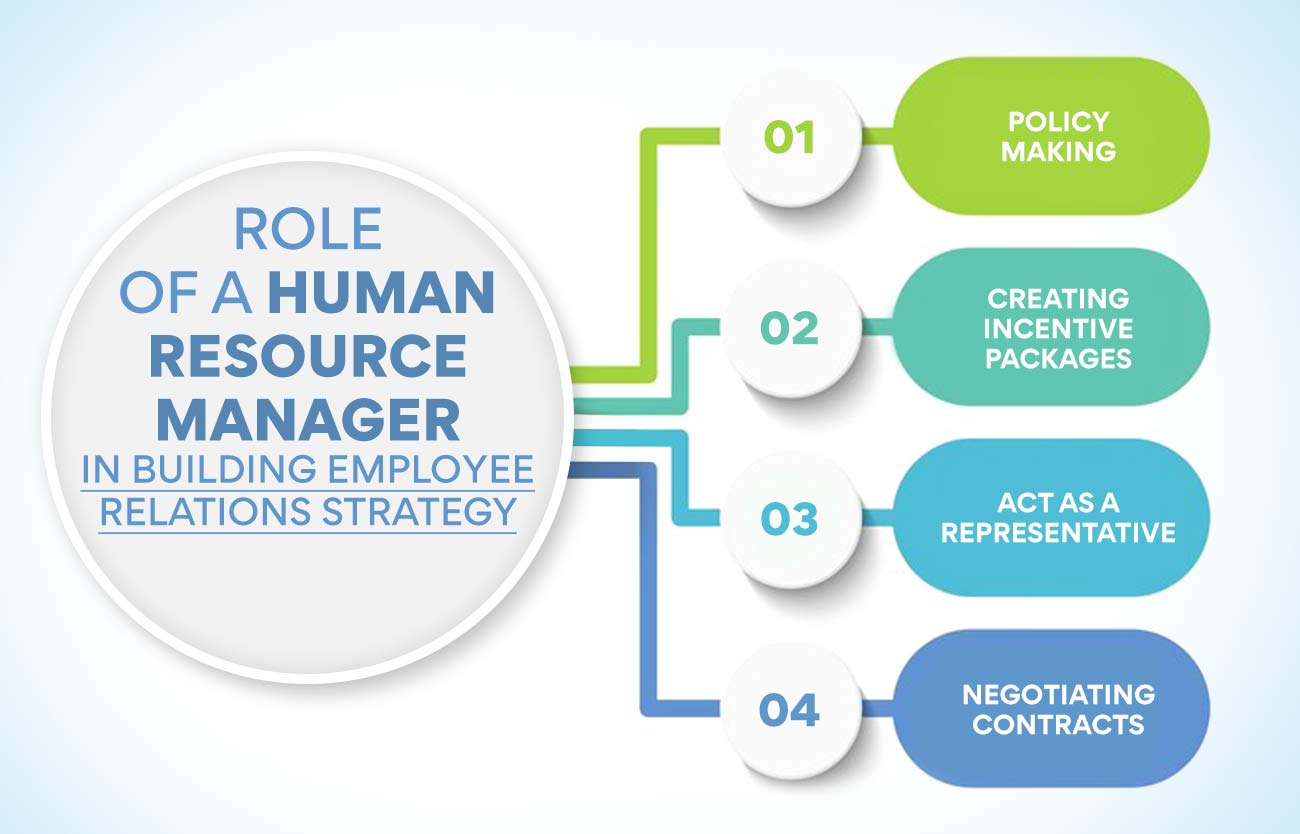 1. Policymaking
1. Policymaking
An effective employee relations program starts with clearly written policies. Company policies determine how individuals behave in the workplace. These policies are made by an HR manager who also has to ensure every individual follows these policies at the firm. The policies play a crucial role in shaping employee relations.
2. Creating incentive packages
Vacations, sick leaves, maternity leaves, health insurance and more count as incentives at the workplace. An ideal incentive package created by the HR manager is built in collaboration with the employees.
3. Act as a representative
As an HR manager, you are not only representing your firm but also the employees. Maintaining a better employee relation can lead to avoiding conflicts and prolonging workplace satisfaction.
4. Negotiating contracts
The contract an employee signs should benefit the employer and the employee. Negotiating the contract with either party to derive a favourable outcome is imperative in ensuring positive employee relations.
In conclusion, building a team takes more than just having a structure laid out. An organisation has to go above and beyond to ensure that its biggest asset, i.e. its employees, are given a positive environment to grow and develop. An organisation with well-curated and considerate policies that provide fair and equal treatment to all its employees helps build a strong employee relationship. It helps team members commit to their jobs with sincerity and loyalty, reduces conflicts and creates an environment of mutual trust and appreciation. With our, postgraduate certificate in Human Resource Management, you can learn in detail how to better employer and employee relations. Our industry-relevant modules and practical learning models allow individuals a critical and in-depth understanding of the industry. The two-year course provides dual certificates from IIM Shillong and SHRM India. Click here to learn more about the course.
More Information:
Evolution Of Human Resource Management: Past and Future
Understanding Talent Management And Its Importance
What is Stakeholder Engagement? Importance, Planning and Implementation








